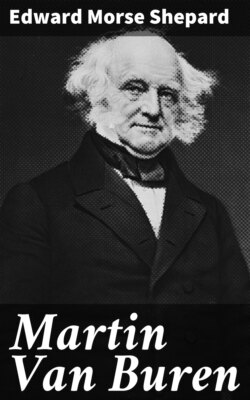Читать книгу Martin Van Buren - Edward Morse Shepard - Страница 3
На сайте Литреса книга снята с продажи.
PREFACE TO THE REVISED EDITION
ОглавлениеTable of Contents
Since 1888, when this Life was originally published, the history of American Politics has been greatly enriched. The painstaking and candid labors of Mr. Fiske, Mr. Adams, Mr. Rhodes, and others have gone far to render unnecessary the caveat I then entered against the unfairness, or at least the narrowness, of the temper with which Van Buren, or the school to which he belonged, had thus far been treated in American literature, and which had prejudicially misled me before I began my work. Such a caveat is no longer necessary. Even now, when the political creed of which Jefferson, Van Buren, and Tilden have been chief apostles in our land, seems to suffer some degree of eclipse—only temporary, it may well be believed, but nevertheless real—those who, like myself, have undertaken to present the careers of great Americans who held this faith need not fear injustice or prejudice in the field of American literature.
In this revised edition I have made a few corrections and added a few notes; but the generous treatment which has been given to the book has confirmed my belief that historic truth requires no material change.
A passage from the diary of Charles Jared Ingersoll (Life by William M. Meigs, 1897) tempts me, in this most conspicuous place of the book, to emphasize my observation upon one injustice often done to Van Buren. Referring, on May 6, 1844, to his letter, then just published, against the annexation of Texas, Mr. Ingersoll declared that, in view of the fact that nearly all of Van Buren's admirers and most of the Democratic press were committed to the annexation, Van Buren had committed a great blunder and become felo de se. The assumption here is that Van Buren was a politician of the type so painfully familiar to us, whose sole and conscienceless effort is to find out what is to be popular for the time, in order, for their own profit, to take that side. That Van Buren was politic there can be no doubt. But he was politic after the fashion of a statesman and not of a demagogue. He disliked to commit himself upon issues which had not been fully discussed, which were not ripe for practical solution by popular vote, and which did not yet need to be decided. Mr. Ingersoll should have known that the direct and simple explanation was the true one—that Van Buren knew the risk and meant to take it. His letter against the annexation of Texas, written when he knew that it would probably defeat him for the presidency, was but one of several acts performed by him at critical periods, wherein he deliberately took what seemed the unpopular side in order to be true to his sense of political and patriotic duty. The crucial tests of this kind through which he successfully passed must, beyond any doubt, put him in the very first rank of those American statesmen who have had the rare union of political foresight and moral courage.
EDWARD M. SHEPARD.
January, 1899.
